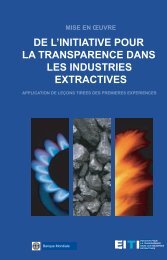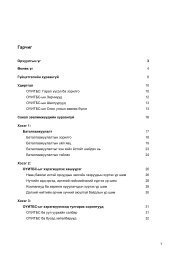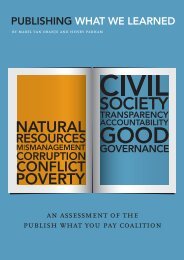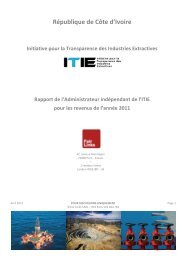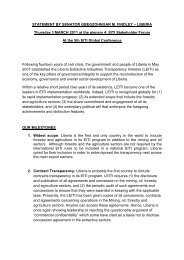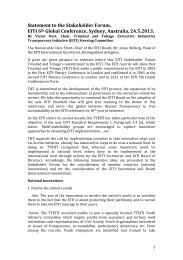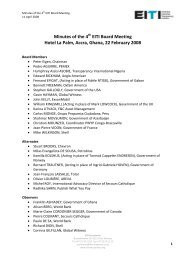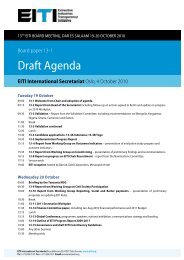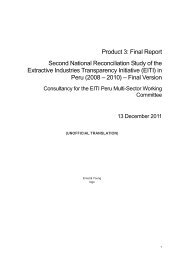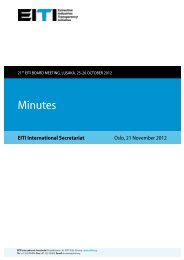Vietnam feasibility study - EITI
Vietnam feasibility study - EITI
Vietnam feasibility study - EITI
Create successful ePaper yourself
Turn your PDF publications into a flip-book with our unique Google optimized e-Paper software.
Meanwhile, in some other regions, the price for calculating natural resources tax was determined by<br />
the price stated in the invoice at the time where the company sold minerals to its partner. Titanium in<br />
Binh Dinh province is an example. Some stakeholders from both company and governmental agency<br />
state that the method of determining price for calculating the natural resources tax was based on<br />
the outward invoice of the company. Consequently, in the situation that the company comes to an<br />
agreement with its partner to set a lower price on this invoice than market value to evade a part of<br />
natural resources tax commonly occurred. Some representatives of the mining companies said that<br />
the calculation method of natural resources tax was still complicated and unfair. They proposed the<br />
state to calculate natural resources tax based on the mine reserves instead of production. They also<br />
proposed the payment of tax to be made in one or several times. This issue is still being debated<br />
amongst the stakeholders with no specific outcome.<br />
In fact, the governmental agencies just conduct their monitoring activities as if they would have<br />
signals of violation from the company itself. Hence, the situation in which the companies declare<br />
by themselves their monthly or quarterly production to the taxation authorities, with no or little<br />
production monitoring. This is a big gap in the extractive industry. Consequently, a huge amount of<br />
mineral resources has been lost throughout the years and the state also loses considerable revenues<br />
from this. As noted, the fact that the extractive companies do not declare their real production seems<br />
to occur commonly in many locations. The unreported product is then smuggled, leading to a big<br />
loss of revenues to the state. The situation of mineral smuggling as with coal, titanium, and iron that<br />
has been mentioned on the press and discussed in the government in recent years in <strong>Vietnam</strong> has<br />
been happening for years. This is despite state management agencies having strengthened their<br />
supervision and inspection tasks in recent times (CAND, 2010; Xa Luan, 2011).<br />
• Fee for the purchase and use of information and money refunded for the exploration fee using the<br />
state budget<br />
The state has issued provisions on the refund of survey and exploration fees, using capital from the<br />
state budget, such as the Inter-ministerial Circular No. 96-TT/LB issued in 1993; the Law on Minerals<br />
issued in 1996; Circular No. 46/TTLT-BTC-BCN dated 21/5/2002 replacing Circular No. 186//2009/TTLT-<br />
BTC-BTN&MT dated 28/9/2009. However, in almost all surveyed provinces, the state has not managed<br />
to collect these amounts or the received amount has been limited. For example, for the coal mines<br />
in Quang Ninh, the state has almost not collected the refund so far. The main reasons are an unclear<br />
division of responsibilities between MONRE and the local authorities about the collection mechanism,<br />
and a poor law enforcement 5 . Another reason is because of the decision to assign the management of<br />
all coal mines in Quang Ninh to the <strong>Vietnam</strong> Coal Corporation - TVN 6 under the Decision No. 481/CN-<br />
QLTN dated 8/6/1995 of the Ministry of Industry, before the issuance of the Law on Minerals in 1996,<br />
leading to confusion over the state management function and economic operation function of TKV.<br />
When TKV started privatization, information about mines as well as previous expenses on exploration<br />
using capital from the state budget were not recorded to assets of companies. Therefore, this revenue<br />
was falled into some individuals, resulting a huge loss to the state.<br />
*4: This report only refers to the situation of legal cheating in the mining sector, but does not mean to refer to some specific enterprises<br />
or localities, especially for enterprises and localities in the interview list.<br />
*5: In Quang Ninh so far, the state has not collected any fee refunded from the expense of exploration using capital from the state<br />
budget. Meanwhile, almost all coal mines in the local area of Quang Ninh were investigated and explored with the capital from the<br />
state budget.<br />
*6: <strong>Vietnam</strong> Coal Corporation – TVN was established in 1994, under the direct management of the Ministry of Industry. In 2001, it was<br />
changed to <strong>Vietnam</strong> National Coal-Mineral Industries Holding Corporation Limited -Vinacomin.<br />
The Extractive Industries Transparency Initiative and the Implementation Perspective of <strong>Vietnam</strong><br />
37



